
Guests
- Khaled Elgindyvisiting scholar at Georgetown University’s Center for Contemporary Arab Studies.
As President Trump celebrates his Gaza ceasefire deal, major questions remain over what happens next. Democracy Now! speaks with Khaled Elgindy, visiting scholar at Georgetown University’s Center for Contemporary Arab Studies, who breaks down the U.S.-backed peace plan. Though the document includes “vague statements” on how the peace process will unfold, Elgindy says it’s wise for “Palestinians to rebuild their national movement” at this time. At the same time, Israel has refused to release political leader Marwan Barghouti, who has spent decades in Israeli prison and is widely seen as a “unifying leader” who could bring all Palestinian factions together.
Transcript
AMY GOODMAN: This is Democracy Now!, democracynow.org. I’m Amy Goodman, with Juan González.
As President Trump celebrates the ceasefire-hostage deal at the Gaza summit in Egypt yesterday, major questions remain over the deal and what happens next.
We turn now to Khaled Elgindy. He is a visiting scholar at Georgetown University’s Center for Contemporary Arab Studies, an adviser to the Palestinian leadership in Ramallah on permanent status negotiations with Israel from 2004 to 2009, author of Blind Spot: America and the Palestinians, from Balfour to Trump.
Welcome to Democracy Now!, Khaled. If you can start off by saying —
KHALED ELGINDY: Thank you.
AMY GOODMAN: — what exactly was signed? We watched, you know, President Trump and the Egyptian President el-Sisi sign a document. What is in this plan at this point?
KHALED ELGINDY: Well, I think the plan is like what we saw announced last week. It is very short on details, except in terms of, you know, this very initial phase, that hostages have to be released within 72 hours, followed by Palestinian prisoners and hostages, and, of course, the cessation of hostilities. Beyond that, the document is sort of big on generalities and, you know, vague statements about the need for peace and security and prosperity for Israelis and Palestinians. It doesn’t say much, frankly. You know, the president likes to talk about this plan as in very grandiose terms, you know, ending a 3,000-year conflict, which, of course, is completely false, but there’s a lot of fluff, frankly, in terms of the substance of the plan itself.
JUAN GONZÁLEZ: And, Khaled Elgindy, nearly 2,000 prisoners were released by Israel, but there was one who was not released. Israel absolutely refused the request of Hamas to release Marwan Barghouti, probably the most famous of all the Palestinian prisoners that Israel has held, widely respected by all political groups. Why do you think that Israel was so insistent on not releasing Barghouti?
KHALED ELGINDY: Well, I mean, they have consistently refused to release him, as you pointed out. I think the main reason is, you know, like any colonial power, Israel wants to keep the people that they subjugate weak and divided. And, of course, they are now. There is a 17-year division between Hamas and Fatah, between Gaza and the West Bank, and that has really crippled and handicapped any kind of diplomatic effort, or even in terms of Palestinian politics, they’ve been paralyzed. So, the last thing Israel wants is someone to emerge who could unify Palestinians, inspire the national movement, possibly even renew the national movement in some way. And so, right now Marwan Barghouti is the person who is most likely to do those things, and so they have to keep him from playing that role, as, you know, emerging as a unifying leader.
AMY GOODMAN: Khaled Elgindy, you’ve said you’re not concerned about Hamas trying to remain in power, but that Palestinian President Mahmoud Abbas and his leadership will try to insinuate itself in Gaza and monopolize the conversation. If you can explain? And also, do you think part of why Netanyahu didn’t attend the summit, though he was invited, was not to be seen with Mahmoud Abbas? Others said it was because the Turkish president, Erdoğan, said he would turn his flight around and go back to Turkey if Netanyahu was there.
KHALED ELGINDY: Yeah, I mean, I think, in terms of — sorry, the first part of your question?
AMY GOODMAN: Was what’s going to happen. What is in the deal around Hamas control of Gaza?
KHALED ELGINDY: Right. Yeah, I think — I think what’s important is for Palestinians, as a collective, to discuss the future of Gaza. And that includes everything, from rebuilding, governance, security, you know, the connection with the West Bank. All of those things are not up to any one particular party, not up to Hamas and not up to Mahmoud Abbas to pursue on their own. And I think Hamas made that clear when they accepted the Trump plan. When they talked about things like disarming or, you know, all of these other aspects, they couched it in the language of a Palestinian consensus. These are matters to be discussed internally.
And I think that was — that was wise. It’s wise for Hamas, because it gives them cover to be able to do those things. But it’s also wise politically, and I think necessary, for Palestinians to rebuild their national movement. You cannot have — right now Mahmoud Abbas is deeply, deeply unpopular. So, importing his very unpopular leadership into Gaza is not going to be very effective. You need to have a broad Palestinian consensus that can move forward together. And so, that was the thrust of that point that I was making about not letting Mahmoud Abbas, or really anyone, monopolize the process.
As far as Netanyahu — yeah.
JUAN GONZÁLEZ: No, I just wanted to ask you — there have been reports that have emerged since the ceasefire that there have been armed clashes between Hamas and other groups within Gaza. Could you — what do we know about this? And, of course, many — most Americans don’t know that Hamas is not the only resistance force within Gaza.
KHALED ELGINDY: Right, it’s not the only resistance force. It’s also not the only armed force. There are armed elements. There are criminal elements. There are tribal elements that are not political but are pursuing narrow self-interests. And there are agents of chaos. There are people who seek to exploit, you know, the power vacuum that existed in Gaza and that still exists for the last two years. We saw, for example, there are many groups that loot aid that was coming in. And some of — in many cases, those criminal elements were at least provided some cover by the Israeli military.
And so, what Hamas says it’s doing now is, first, it is establishing some kind of law and order in, you know, preventing chaos and lawlessness, which is, you know, something that is very normal when there is a power vacuum. And when there is enormous death and destruction and despair and trauma, there are people who emerge who want to take advantage of that. So, on the one hand, it is to prevent chaos.
There is, I think, an element also of settling scores, particularly with people who are seen as collaborators with Israel. You know, they’re not necessarily being tried and, you know, receiving due process. But, you know, there is some kind of process that may not meet the basic standards.
But I think this is what — this is what Hamas is trying to do. I don’t necessarily think that they are trying to hold on to power. I think they are trying to demonstrate that they are brokers and will be part of decision-making going forward, but not necessarily the sole governing authority, as they were before October 7.
AMY GOODMAN: Khaled Elgindy, what about the fact that, I mean, Palestinians continue to be killed, at least five yesterday by Israeli forces, apparently? What stops Israel from engaging in a full-scale assault, just moving back in, as happened before, the last ceasefire?
KHALED ELGINDY: Yeah, I think there’s nothing that stops them — I mean, you know, barring, of course, the president of the United States. And we saw how that played out in March. The president gave Netanyahu basically a green light to — you know, to destroy that ceasefire after the first phase. That may or may not happen this time. We don’t know. I mean, my sense is that President Trump seems to be much more serious about it this time, for his own calculations.
But, you know, this is — this is typical of how Israel relates to a ceasefire. We saw this in Lebanon, where even today, almost a year after a ceasefire between Israel and Hezbollah, Israel still acts more or less freely in Lebanon, as it does in Syria and other places, and as it certainly will continue to do in Gaza. It will strike people wherever and whenever it feels it needs to. And the pattern has been, as long as it’s not, you know, on a massive scale, that that will be tolerated. And so — but that can also be ratcheted up gradually, right? It can be five over the last few days, and then that number can increase. And there is this kind of, you know, drip effect that desensitizes the international community, which has already stopped paying attention to the issue at this point. And so — but the plan doesn’t have any restraints on Israel, doesn’t — there’s no timetable for Israel to withdraw. So, it’s really up to the discretion —
AMY GOODMAN: Of Palestinian statehood, Khaled?
KHALED ELGINDY: Sorry?
AMY GOODMAN: Any discussion of Palestinian statehood?
KHALED ELGINDY: Well, there’s a lot of discussion among —
AMY GOODMAN: No, in the ceasefire-hostage deal that was signed yesterday.
KHALED ELGINDY: Oh. There is a reference to, in aspirational terms, about a Palestinian state. But it is not — there are no steps toward a state. We know that Israel completely rejects the idea of a Palestinian state. So it’s not really on the table as part of this plan in the way, let’s say, that previous peace plans, like the 2003 road map, had very concrete steps that needed to be taken in order to reach a Palestinian state. Now it’s merely stated as a Palestinian aspiration but is not something that is a serious — you know, seriously part of that.
AMY GOODMAN: And very quickly, the Arab and Muslim countries, their role — apparently, Indonesia — in rebuilding? Of course, there’s Saudi Arabia. There’s a meeting going now in Sussex in England about rebuilding. What is the role of Arab and Muslim countries also in a — what has been talked about as an international stabilization force?
KHALED ELGINDY: Yeah, I mean, I think there is an expectation that Arab and Muslim countries are going to play a very large role in both of those, financing the reconstruction of Gaza, particularly the Arab Gulf States, of course, because they have considerable resources and a direct stake in the stability of the region, and they’re also being talked about as candidates, you know, to contribute forces in this international stabilization force. But we don’t have clear commitments on either front.
I think we’re much more likely to see movement on pledges and donor assistance to contributing to a reconstruction fund of some kind. I think it will be much harder to convince countries to commit troops, at least until there is more clarity on what the mission or mandate of this force is going to be, under whose command, what sort of role are they going to play, what will be its relationship with the Israeli military, because the last thing that any of these countries want to do is to be seen as an occupying power or as doing the dirty work of the current occupying power, which, of course, is Israel. So, those are things that are going to be worked out over the medium term, I think.
AMY GOODMAN: Khaled Elgindy, we want to thank you so much for being with us, visiting scholar at Georgetown University’s Center for Contemporary Arab Studies, served as an adviser to Palestinian leadership in Ramallah for permanent status negotiations. He’s the author of Blind Spot: America and the Palestinians, from Balfour to Trump. We’ve been trying to reach the Al Jazeera correspondent on the ground in Gaza City but have been unable to, as the internet is down.

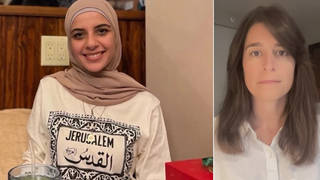
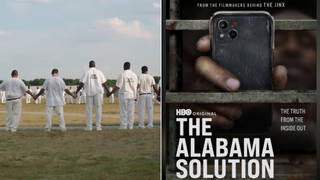
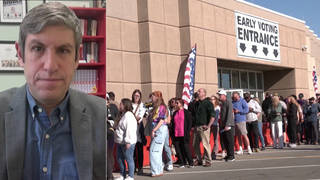
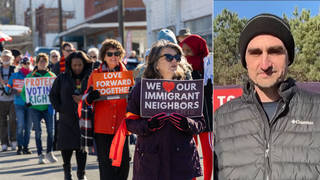





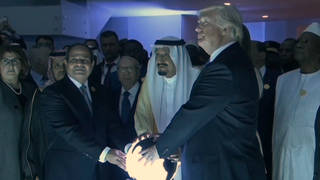

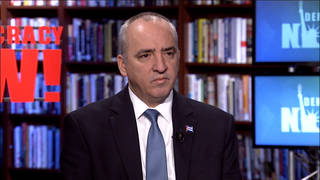
Media Options